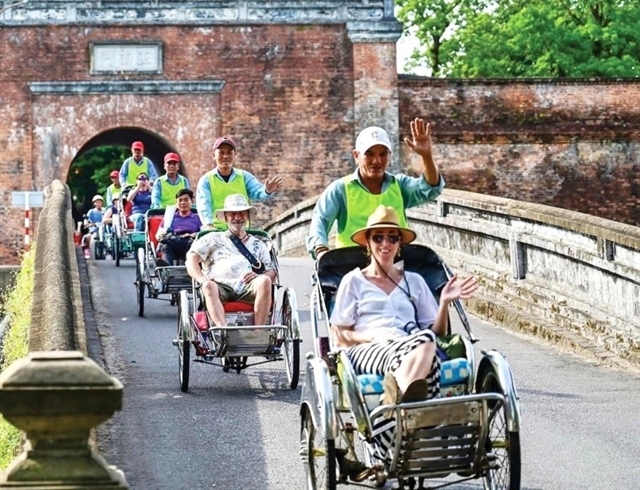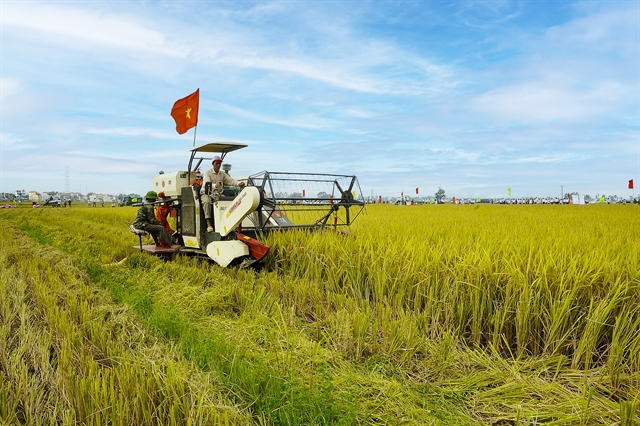 Society
Society

 |
| Hà Nội is gradually implementing regional zoning plans linked to the development of green and modern agriculture, laying the foundation for a safe, efficient, and environmentally friendly agricultural sector. Photo courtesy of the city's Department of Agriculture and Environment |
Amid mounting pressures from rapid urbanisation, climate change and the growing demand for sustainable food security, Hà Nội is actively implementing regional zoning strategies tied to the development of green and modern agriculture.
This initiative lays the foundation for a safe, efficient and environmentally friendly agricultural system that aligns with the capital’s long-term development goals.
As the political, economic and cultural heart of Việt Nam, Hà Nội is often associated with dynamic urban growth. However, few may realise that over 44 per cent of the city's total land area remains agricultural - a significant advantage if harnessed through proper planning and strategic development.
According to Nguyễn Xuân Đại, director of the Hà Nội Department of Agriculture and Environment, the city has for many years pursued a comprehensive restructuring of its agricultural sector along the principles of 'green - efficient - sustainable'. In this approach, agriculture is no longer viewed solely as an economic activity, but also as a cornerstone of environmental protection, food security and ecological balance within the city.
Restructuring production zones is not merely about rearranging farmland. It represents a broader strategy to preserve soil and water resources, safeguard natural habitats, reduce greenhouse gas emissions and improve resilience to climate change. In recent years, Hà Nội has achieved positive results in this direction, especially in crop and livestock production.
Crop cultivation has undergone a transformation toward organic and high-tech methods. The city currently has over 523 hectares of vegetables grown under organic or near-organic practices, achieving average yields of 50 tonnes per hectare per year, 15-20 per cent higher than conventional methods. In addition, 908 hectares of vegetable farms now apply high-tech solutions such as greenhouse systems and drip irrigation, helping to improve product quality while conserving natural resources.
In the livestock sector, Hà Nội has adopted circular farming practices that emphasise emission reductions and environmental safety. Many farms operate with closed-loop barn systems, automated feeding technologies, and biological waste treatment measures.
Notably, 95 per cent of large-scale pig farms use biogas systems, while 65 per cent of livestock facilities apply biological agents to treat waste. These innovations help ensure compliance with technical standards while supporting the transition away from small-scale backyard farming in densely populated areas.
Hà Nội is also developing a model of urban agriculture that integrates high-tech farming with experiential tourism in peri-urban areas. This is part of the city's broader strategy to transform agricultural land in urbanising zones into smart ecological spaces - enhancing local food production, boosting farmers’ incomes, and meeting the consumption demands of a growing urban population.
According to Bùi Văn Sáng, Party Secretary of Tam Hưng Commune, his commune, under the two-tier local governance model, is not only expanding in terms of population and land area but also possesses great potential for the development of green, ecological and circular agriculture.
With its deep-rooted farming traditions, the commune is well-positioned to establish specialised production areas for vegetables, ornamental plants, fruit trees, and aquaculture. The local government is restructuring its agricultural space with a focus on concentrated, eco-friendly, and high-tech models, while enhancing land-use management and aligning planning with socio-economic development.
In Hồng Vân Commune, local authorities are leveraging the area’s natural advantages to promote agriculture as part of the cultural and tourism fabric.
Lê Tuấn Dũng, Chairman of the People's Committee of Hồng Vân, emphasised that the commune was already a recognised tourism destination and had developed flower-lined roads and green corridors that support agri-tourism models. These initiatives catered to the tastes of urban residents and aligned with global trends in sustainable tourism.
Agriculture in Hồng Vân is seen not only as a productive sector but also as a key element in shaping the landscape, preserving cultural identity, and laying the 'ecological foundation' for integrated development in tourism, services, and culture, according to the chairman.
The commune’s strategy focuses on three main pillars: restructuring cultivation zones toward organic and circular models; developing experiential tourism destinations; and building value chains for local agricultural products tied to regional branding.
Nguyễn Mạnh Quyền, Vice Chairman of the Hà Nội People’s Committee, emphasized that the city was aligning its green agricultural zoning efforts with key legal and strategic frameworks.
These include the Capital Law, passed by the National Assembly on June 28, 2024, and Decision No. 1668/QĐ-TTg dated December 27, 2024, issued by the Prime Minister to approve adjustments to Hà Nội’s General Planning toward 2045 with a vision to 2065.
Based on these frameworks, Hà Nội has reviewed, adjusted, and supplemented designated zones for crop cultivation, livestock farming, and aquaculture to better reflect real-world conditions, according to Quyền. The capital is re-establishing its ecological spatial system, positioning agriculture as a form of green infrastructure - serving both as a food belt and an ecological buffer zone.
It is clear that Hà Nội’s agricultural restructuring, integrated with green zoning and the ecological urban strategy, is a necessary pathway to ensure agricultural economic development, maintain ecological landscapes, improve quality of life and strengthen climate resilience.
The city has set a target for the 2030–2045 period: to become a fully green urban area with ecological agriculture forming the backbone of an interconnected system that sustainably unites land, people, and nature.
According to Director Nguyễn Xuân Đại, Hà Nội is restructuring agricultural production across all sectors. In crop cultivation, the city will optimise land use, adopt advanced technologies and develop high-value products. Irrigation-challenged rice fields will be converted to more economically viable crops, and focus will be placed on crop varieties and technologies suitable for the unique conditions of peri-urban soils.
In livestock, Hà Nội will continue developing strategic zones for concentrated animal farming. The city is reviewing plans to establish large-scale livestock areas in rapidly urbanising districts, while phasing out small-scale operations in residential zones. In compliance with Resolution No. 02/2020/NQ-HĐND of the Hà Nội People’s Council, Hà Nội is ending livestock farming in certain areas and supporting the relocation of facilities located in restricted zones.
Aquaculture is also being developed along sustainable lines, with a focus on high productivity and quality. Hà Nội’s strategy includes the protection of aquatic ecosystems, environmental safeguards, climate change adaptation, disease prevention, environmental monitoring, and food safety from the outset of production.
Simultaneously, the city is integrating green, clean, and sustainable agricultural methods into training programs that link theoretical learning with local practice - helping farmers improve their knowledge, technical skills and capacity to participate in the new agricultural economy.
Regional zoning tied to green agricultural development is a timely and strategic initiative for Hà Nội in the face of new challenges. Beyond enhancing production efficiency and ensuring food safety, this approach fosters the creation of ecological zones, improves living conditions and contributes directly to the city’s broader goal of sustainable urban development.
With forward-looking vision and methodical implementation, Hà Nội is steadily shaping a new agricultural identity that is modern, environmentally responsible and rich in potential. VNS




